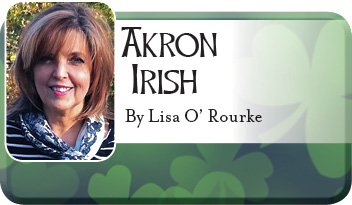
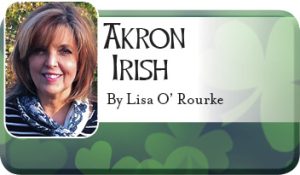
Akron Irish: The Big Fella
by Lisa O’Rourke
The image is iconic, a large tweedy guy, almost too big looking for the bike, laconically riding it anyway, around the streets of Dublin. He was or is of course, The Big Fella, Michael Collins, a pivotal figure of Irish 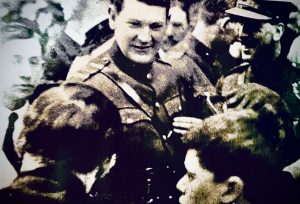 Independence.
Independence.
However he appeared; the man was not riding around Dublin without purpose. It was one of many tricks he had for changing his appearance or blending into a crowd. He had a knack for making himself invisible, in looking away at the right moment. The image is memorable in another way, because it is so incongruous.
At that time, that he was a Dublin cyclist, he was a tactical organizer for a group nicknamed The Squad. The Squad was a group of Irish rebels, organized to eliminate the British intelligence that were stationed primarily in the capital city during the Irish war for independence.
Just in case this is reaching a reader or two who are not very familiar with Michael Collins, he was an important figure in the founding of the Irish Republic over a hundred years ago. He was born in Cork, and from a very early age, he was an Irish nationalist. He was present at the Easter Rising, an aide to Padraig Pearse.
Collins survived that day, and the ensuing firing squads that were the fate of other Rising leaders. The story is that he was not identified correctly at the time and put in jail, without even a mugshot. He was imprisoned and by the luck of a mistaken identity again, given a softer sentence, a jail term in Wales.
Like many, he used his jail time wisely, to recruit everyone that he could to the Irish cause. His release led the determined young man back to the capital and back to the Irish Republicans. He was elected as the tactical leader of the resistance during the ongoing Irish rebellion.
Irish Independence
This part of Irish history is of particular fascination to me. The Easter Rising was the flashpoint of the move for independence, but the actual war was a guerilla one, fought in the small towns and the cities all over the country. The Irish side had all kinds of men and women all over the country. Almost none of them were soldiers or anything of the kind; they farmed or sold groceries or taught school or labored.
These men and women were secret weekend soldiers. Their activities took place in villages where no one keeps a secret, let alone lives an anonymous life.
The English side were professional soldiers, the infamous Black and Tans among them. They operated around the country from makeshift barracks, stationed on parts of English landlords’ properties. Many an Irish historic home was burned to the ground to keep it from being converted to barracks.
The Black and Tans were notorious for their merciless tactics. They got very little, if any, cooperation from the natives, since most of the natives supported the move to independence.
One of their tactics was to force a man they might encounter into their vehicle. They would drive around with him and make a show of him to his neighbors, so that they all wondered if he had betrayed them. There was plenty of torture and senseless murder at their hands to be had as well.
Stories, Sources and Resources
These stories are available as firsthand accounts on the internet site listed below. The archived historical information is released in batches, just like in our own country. A group of letters, notes and dispatches have been posted on the site recently that are linked to the Big Fella himself, both in his hand and from his hundreds of field lieutenants that were all over the Irish countryside.
Irresistible. But where to start? Since I wanted to get a real sense of this myth and man of many faces, I decided to frame my view with the area that I know best, so I went for the Roscommon papers.
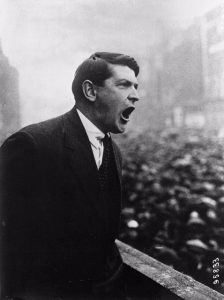 The charismatic rebel Collins did not appear in those papers. He appears almost immediately to be the civil servant that he was for a short time. He chides the area leader for a late and sloppy report, he fusses over lack of dues to the cause. Tardiness and money take up a surprising amount of ink.
The charismatic rebel Collins did not appear in those papers. He appears almost immediately to be the civil servant that he was for a short time. He chides the area leader for a late and sloppy report, he fusses over lack of dues to the cause. Tardiness and money take up a surprising amount of ink.
In fairness, the Irish do not have a reputation for being easily led or organized. I am certain that he must have felt like he was herding feral cats at times. But dues and tidy reports do not make for heroic tales. After another written reprimand regarding a late report, the district leader and grandfather, Dan O’Rourke, finally lets loose; you can sense his frustration bursting forth. He writes something that will be very familiar to us now, that he could only attest for the time that the report left his hands, not how it travelled.
Dan finishes the letter by telling Collins that he does not understand the risks that the men in the country are taking, that their anonymity is thinly veiled at best. Collins’s reply was in agreement in tone, but tepid and unapologetic.
And honestly, to my ears, it sounded indifferent. But why would he be apologetic? All the people who involved themselves in the struggle at that time knew that it could end in their death. Collins surely saw, correctly, that the odds of him growing old were slim at best. That sense had to have created in him a great sense of anxiety and an urgency to get things accomplished. Yet, there he is on paper and he appears human.
The historical archives are peeling away layers to reveal something tangible about the elusive Michael Collins. In addition to being heroic, he sounded crabby and pedantic. It sounded tone deaf that he seemed unaware or indifferent to the risks that were taken outside of the capital. Michael Collins and his Squad took risks and were in constant danger themselves, just in an overcrowded city of a million people.
So, heroes are human beings, inspirational, but human. What they all had in common was that humanity blended with courage. I would encourage anyone who has not yet looked at this site to do so. You might find a face you know in all those stories. Ireland would not exist without their kind.
https://www.militaryarchives.ie/collections/online-collections/the-collins-papers/
*Lisa O’Rourke is an educator from Akron. She has a BA in English and a Master’s in Reading/Elementary Education. Lisa is a student of everything Irish, primarily Gaeilge. She runs a Gaeilge study group at the AOH/Mark Heffernan Division. She is married to Dónal and has two sons, Danny and Liam. Lisa enjoys art, reading, music, and travel. She likes spending time with her dog, cats and fish. Lisa can be contacted at [email protected].
Please send any Akron events to my email!
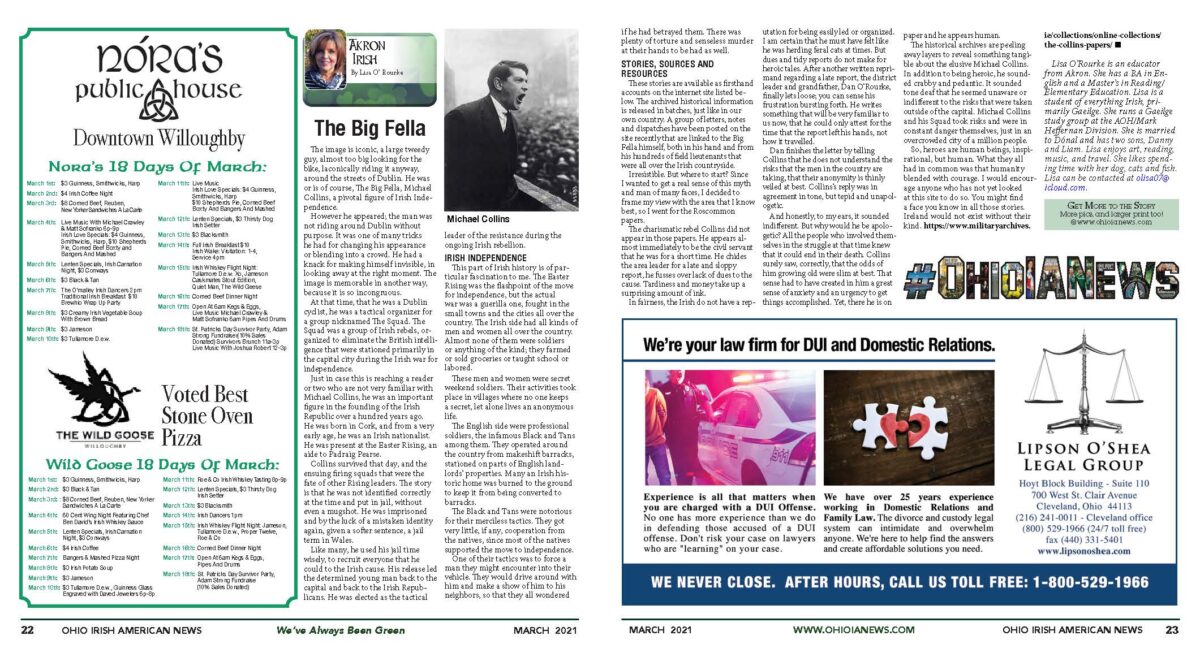

Monthly newsmagazine serving people of Irish descent from Cleveland to Clearwater. We cover the movers, shakers & music makers each and every month.
Since our 2006 inception, iIrish has donated more than $376,000 to local and national charities.
GET UPDATES ON THE SERIOUS & THE SHENANIGANS!